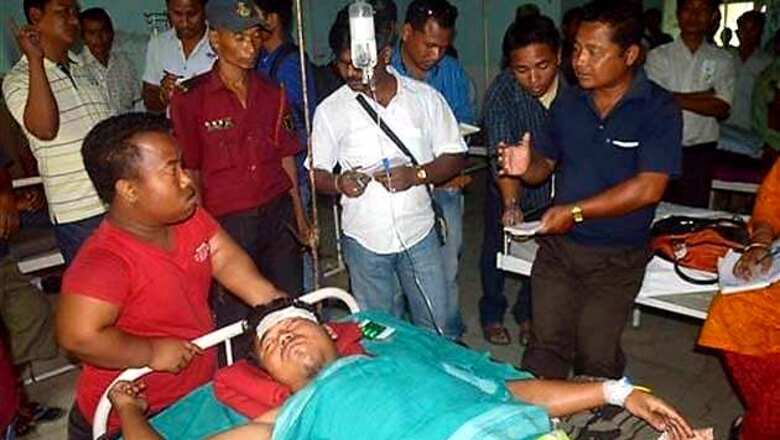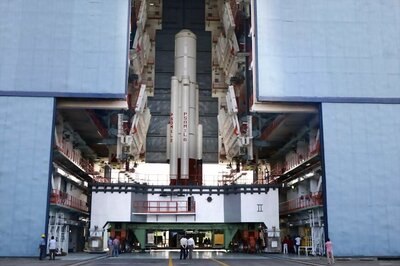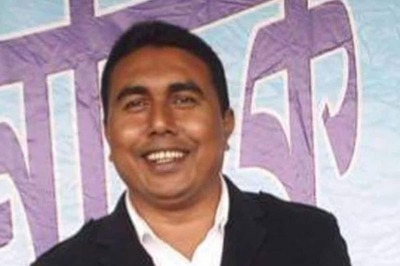
views
As Assam's Bodo Territorial Autonomous District (BTAD) staggers under multiple militant attacks and arson, the political games being played by remote and largely oblivious players will only aggravate an already volatile situation.
While the Congress in power in Guwahati and Delhi has been doing what it does best - issuing milk-and-water condemnations - the state opposition has called for the Chief Minister to be held to account. In Delhi, the BJP says the lives of minorities (read Muslims) are not safe under Chief Minister Tarun Gogoi's regime. None of these statements have a handle on the facts, and the communal angle will only boomerang with greater intensity elsewhere in the country, as seen in the previous spiral of violence in Bodo areas in 2012, when Northeasterners were asked to leave by Muslim groups in south India on the mistaken notion that it was a communal flare-up.
This was far from the case then and remains so today. The violence in Kokrajahar is because of complex political factors which have very little to do with any alleged communal discord in Assam. For this a look at recent events in BTAD is needed, something which never happens when it comes to the Northeast until corpses begin piling up. It begins with a man Assam's security apparatus long thought had ceased to cause them headaches - the former commander of what was once ULFA's most effective battalion, Hira Sarania. After leaving the rebel group, Sarania has been back in the news lately because he is contesting the Kokrajhar seat, under his real name, Naba Kumar Sarania.
Sarania, once a dreaded name in multiple campaigns against the Indian state while the ULFA was still operationally capable, is being backed by the Sanmilita Jatiya Oikya Mancha (roughly translated as United Communities Forum), an umbrella organization of non-Bodos in BTAD. These include, but are not limited to, Muslim students groups. Non-Bodos have been opposed to the formation of BTAD and its territorial map, saying they constitute more than 75 per cent of the area's population and BTAD officials discriminate against them.
There is some substance to his campaign, certainly. Sarania is a local from the area and is seen as the only likely candidate with a reputation fearsome enough to keep Bodo militants from his tail, and presumably enough residual goodwill with the militant leadership to avoid a direct attempt on his life.
However, since the bloody ethnic clashes of 2012 between Bodos and what are alleged to be illegal migrant Bangladeshis in the area, BTAD has been a tinderbox waiting for another match. Sporadic violence has been occurring in the runup to the elections. The tipping point came with a comment by Kokrajhar (East) MLA Pramila Rani Brahma, sister of the BTC chairman himself, powerful Bodo leader Hagrama Mohilary.
Now, observe the political maneouvres which have been going on. Mohilary was angry with sitting MP SK Bwiswmutiary, who was denied a ticket in favour of another candidate from their party, the Bodo Peoples Front (BPF), state Transport Minister Chandan Brahma. Bwiswmutiary, publicly unhappy over this slight, put up his own candidature. So Pramila Rani Brahma, on her part angry over the MP's perceived insult of her brother, recently made a statement that the BPF candidate would have a tough time winning because the non-Bodos had consolidated behind Sarania. This raised the temperature between Bodo and non-Bodo groups.
It is the old, old Indian political game of vote banks and the bogey of minority (in this case majority) consolidation. Into this mix has entered the deadly arm of the National Democratic Front for Bodoland (Songbijit), the diehard anti-talks faction of the separatist militant group, which has sent in roving bands of hit quads and carved a swathe of death and arson in Kokrajhar and Baksa districts. The targets this time are alleged illegal Bangladeshis, while the targets by extension are other illegal Bangladeshis and Nepalese immigrants across BTAD (whose numbers, say Bodo leaders, has been rising exponentially). The NDFB prefers them gone and figured this would be a good time to escalate matters.
The NDFB refuses to comment on what was till the day before yesterday a purely political feud among Bodo leaders with non-Bodos playing a cameo. "The Bodo people will not stand for usurpation of their land by illegal immigrants while the government remains unconcerned," said an NDFB (S) leader today.
The key action right now is to bring the situation under control and ensure the rule of law. Meanwhile, local leaders should refrain from issuing statements that might spark of riots involving civilians. On the other hand, Assam and the rest of the country's political parties need to pay heed to events in the recent past, and not colour these attacks as communal in nature. There has been ethnic discord in Assam in the past, but Indian Muslims are not the target. This is more a case of regional and ethnic aspirations gone haywire, and not communal discord. We are certain national parties can look elsewhere for political brownie points during these elections and not issue statements that might get Indian citizens from the Northeast targeted by Muslims elsewhere in the country.



















Comments
0 comment